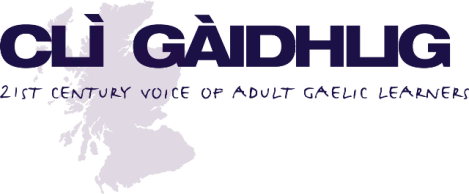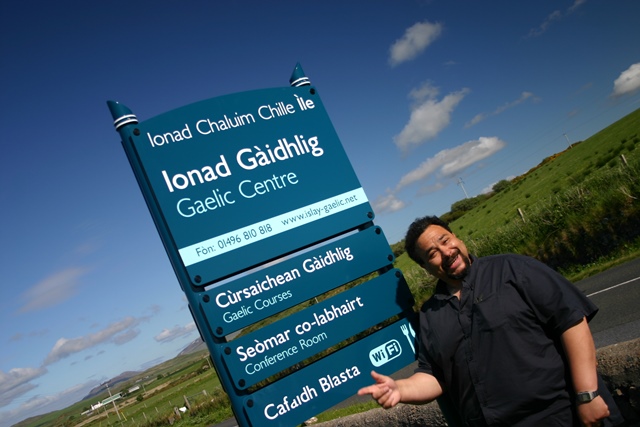With the travel and employment opportunities brought about by the EU, more of us than ever before probably work alongside or know people who have more than one language at their command. In Scotland, we’re also seeing a rise in people learning one particular language, one that brings with it opportunities in media, education and even healthcare. What language are we talking about? Gaelic.

Gaelic in the 21st century
Catriona Todd works as a receptionist at Ospadal Nan Eilean (Hospital of the Isles) in Stornoway on the Isle of Lewis. She’s seen first-hand the changes in the way that the language is treated. When she was growing up, she remembers that –
“Gaelic was treated with contempt. In the community, Gaelic was the only language, yet when I went to Primary School only English was allowed.”
These days though, ‘having the Gaelic’ is a positive bonus in her work. Many of the older patients dealt with at the hospital prefer to converse in it as it’s still their first language, creating a more comfortable experience for them. This can particularly be the case with stroke victims, who may require more support with communication.
On the downside, she does acknowledge that it can be a challenging language for people to learn. Her husband, from Glasgow, still only has a limited grasp of it, finding it difficult to master. Another issue is the difference between learned Gaelic and colloquial Gaelic, something that Catriona likens to “the difference between Queen’s English and normal English”.
Learning Gaelic at any age
Though it may be a challenging language, it’s a challenge that more and more people are taking on. Clì Gàidhlig is the national adult learners’ agency for Scots Gaelic. The agency’s Director, D.J. MacIntyre, points out that you’re never too old to pick it up.
“You are able to learn Gaelic at any age. People on occasion decide to have a career change and that could come at any point in their lives. Some folk take learning Gaelic as a hobby and then decide they would like to work in that sector. There are Gaelic services out there to suit requirements regardless of age.”
As D.J. mentions, learning Gaelic for career reasons is becoming an increasingly popular option, so just what kind of roles are out there for Gaelic speakers?
“The Gaelic TV Channel BBC Alba was not about ten years ago and other Gaelic resources such as Gaelic Medium Education, Gaelic Plans for Public Bodies etc. have increased hugely in the last few years. With that increase comes jobs.”
Performing in Gaelic language
One Gaelic learner is teacher and stand-up comedian, Bruce Fummey. Bruce has been learning the language for a couple of years now and has found that it’s had a huge impact on his life. A desire to keep his permanent base close to Perth means that he can’t yet see the day when he’d take a permanent teaching role in Gaelic but his pursuit of the language has opened him up to new experiences along the way.
“In my pursuit of learning the Gaelic language, I’ve taken up short-term teaching roles in locations like Islay and Oban. Although the teaching has been in English, it’s allowed me closer access to Gaelic resources and given me more opportunity to practise with speakers of it. As well as that though, it’s allowed me to see some of the most beautiful sights that Scotland has to offer. Had it not been for my desire to learn Gaelic, I might have missed out on some of these fantastic experiences.”
Even if Bruce can’t see himself ending up in a permanent teaching role in the Gaelic language, can he see the day when he might turn to performing in Gaelic?
“Well, I have performed in Gaelic in a couple of short, informal appearances…”.

It seems that the use of Gaelic in performance is important to its continuing resurgence, as D.J. explains:
“I think most of us agree that the emergence of BBC Alba has resulted in an increase in demand for the Gaelic voice to be used in the public arena. It would be sacrilege to think that festival such as Celtic connections, Blas and Belladrum would be the same without Gaelic performers. It’s important to have the Gaelic language as part of the norm in Scottish life.”
A part of Scottish heritage
Whether you’re looking for a Gaelic-specific role or not, there are certainly benefits to being bilingual.
“The ability to speak two languages or more is always accepted as a special gift and to be able to speak Gaelic results in an immersion of individuals in the culture and heritage of this beautiful land. Although people will disagree, Gaelic was spoken throughout Scotland and for that reason there should be a sense of pride if a person is able to understand a particular Gaelic road sign or Gaelic phrase. It is vital that the language is revitalised and by learning the language you are able to be part of a small but special group of people that are conversing in our native tongue. It also enables people to have a better understanding of what those beautiful Gaelic songs and music are all about. Gaelic is part of Scotland.”
At s1jobs we’re keen for both people brought up with the Gaelic language and later learners to realise that ‘having the Gaelic’ is now something that brings a variety of employment opportunities with it. The resurgence of the language is being felt across Scotland and jobs for speakers are no longer confined to the Highlands and Islands. We fully support the efforts of the organisations, individuals and learners who are helping to create such a buoyant and fruitful environment for the language.
Images courtesy of contributors.
